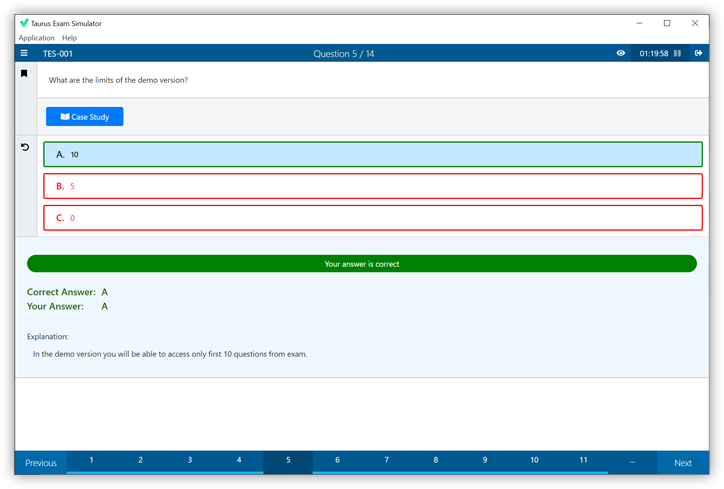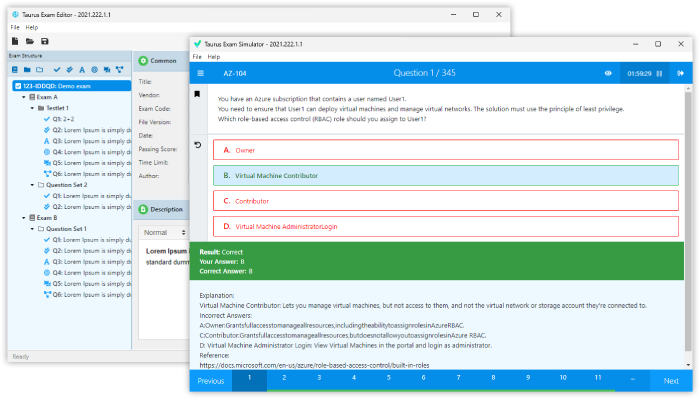Download Oracle.1z0-102.TestKing.2018-08-24.60q.tqb
| Vendor: | Oracle |
| Exam Code: | 1z0-102 |
| Exam Name: | Oracle Weblogic Server 11g: System Administration I |
| Date: | Aug 24, 2018 |
| File Size: | 1 MB |
| Downloads: | 1 |
Demo Questions
Question 1
Which three statements are true about WebLogic clusters?
- Clusters provide clients with transparent failover.
- EJB applications can be targeted to an entire cluster.
- All cluster members must bind to the same port number.
- Cluster members replicate application data by using heartbeats.
- Cluster members can be associated with one or more domains.
- Web applications require a proxy in order to be used in a cluster.
Correct answer: ABC
Explanation:
A: If an object is clustered, failover and load balancing for that object is available.In a WebLogic Server cluster, application processing can continue when a server instance fails. You “cluster” application components by deploying them on multiple server instances in the cluster—so, if a server instance on which a component is running fails, another server instance on which that component is deployed can continue application processing. The choice to cluster WebLogic Server instances is transparent to application developers and clients. B: A clustered application or application component is one that is available on multiple WebLogic Server instances in a cluster. If an object is clustered, failover and load balancing for that object is available. Deploy objects homogeneously—to every server instance in your cluster—to simplify cluster administration, maintenance, and troubleshooting.Web applications can consist of different types of objects, including Enterprise Java Beans (EJBs), servlets, and Java Server Pages (JSPs). Note: Load balancing and failover for EJBs and RMI objects is handled using replica-aware stubs, which can locate instances of the object throughout the cluster.C: Cluster Multicast Address and PortIdentify the address and port you will dedicate to multicast communications for your cluster. References: A: If an object is clustered, failover and load balancing for that object is available.
In a WebLogic Server cluster, application processing can continue when a server instance fails. You “cluster” application components by deploying them on multiple server instances in the cluster—so, if a server instance on which a component is running fails, another server instance on which that component is deployed can continue application processing.
The choice to cluster WebLogic Server instances is transparent to application developers and clients.
B: A clustered application or application component is one that is available on multiple WebLogic Server instances in a cluster. If an object is clustered, failover and load balancing for that object is available. Deploy objects homogeneously—to every server instance in your cluster—to simplify cluster administration, maintenance, and troubleshooting.
Web applications can consist of different types of objects, including Enterprise Java Beans (EJBs), servlets, and Java Server Pages (JSPs).
Note: Load balancing and failover for EJBs and RMI objects is handled using replica-aware stubs, which can locate instances of the object throughout the cluster.
C: Cluster Multicast Address and Port
Identify the address and port you will dedicate to multicast communications for your cluster.
References:
Question 2
Which three statements are true when an Administration Server is compared to a managed server?
- A domain must have at least one of each type of server.
- Administration Server keeps a domain log, but a Managed Server does not.
- A Managed Server keeps a server log, but an Administration Server does not.
- When a Managed Server comes up, it asks its Administration Server for the latest configuration.
- An Administration Server manages the domain configuration.
- JEE applications are deployed only to a Managed Server.
Correct answer: DEF
Explanation:
D: When a Managed Server starts, it contacts the Administration Server to retrieve its configuration information. If a Managed Server is unable to connect to the specified Administration Server during startup, it can retrieve its configuration directly by reading a copy of the config.xml file and other files located on the Managed Server's own file system.E: One instance of WebLogic Server in each domain acts as an Administration Server. The Administration Server provides a central point for managing a WebLogic Server domain.F: For a typical production system, BEA recommends that you deploy your applications only on Managed Servers. This practice allows you to dedicate the Administration Server to configuration and monitoring of the domain, while one or more Managed Servers service your applications.References: D: When a Managed Server starts, it contacts the Administration Server to retrieve its configuration information. If a Managed Server is unable to connect to the specified Administration Server during startup, it can retrieve its configuration directly by reading a copy of the config.xml file and other files located on the Managed Server's own file system.
E: One instance of WebLogic Server in each domain acts as an Administration Server. The Administration Server provides a central point for managing a WebLogic Server domain.
F: For a typical production system, BEA recommends that you deploy your applications only on Managed Servers. This practice allows you to dedicate the Administration Server to configuration and monitoring of the domain, while one or more Managed Servers service your applications.
References:
Question 3
Which three tasks can be performed by the Node manager?
- Start a server.
- Define a node server.
- Host the Node Manager console.
- Automatically restart a failed server.
- Kill a failed application on a server.
- Kill the process of a server that did not shut down properly.
Correct answer: ABD
Explanation:
Node Manager enables you to perform these tasks:Start and stop remote Managed Servers. (A) Monitor the self-reported health of Managed Servers and automatically kill server instances whose health state is "failed". Automatically restart Managed Servers that have the "failed" health state, or have shut down unexpectedly due to a system crash or reboot. (D) Node Manager enables you to perform these tasks:
- Start and stop remote Managed Servers. (A)
- Monitor the self-reported health of Managed Servers and automatically kill server instances whose health state is "failed".
- Automatically restart Managed Servers that have the "failed" health state, or have shut down unexpectedly due to a system crash or reboot. (D)






